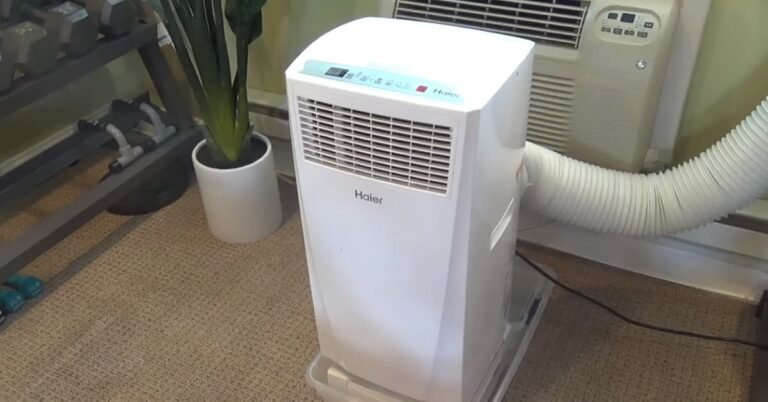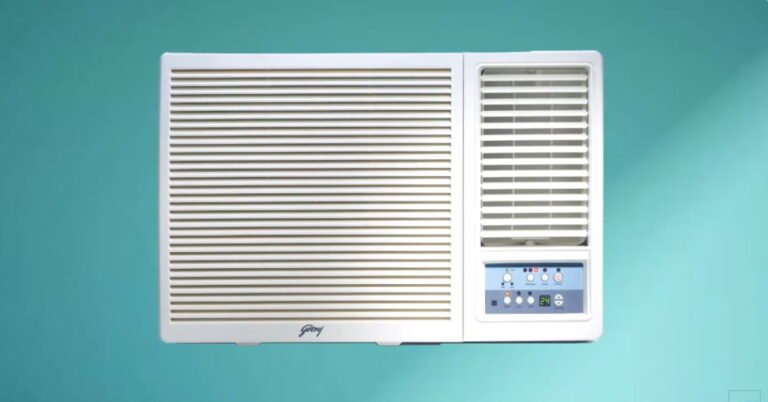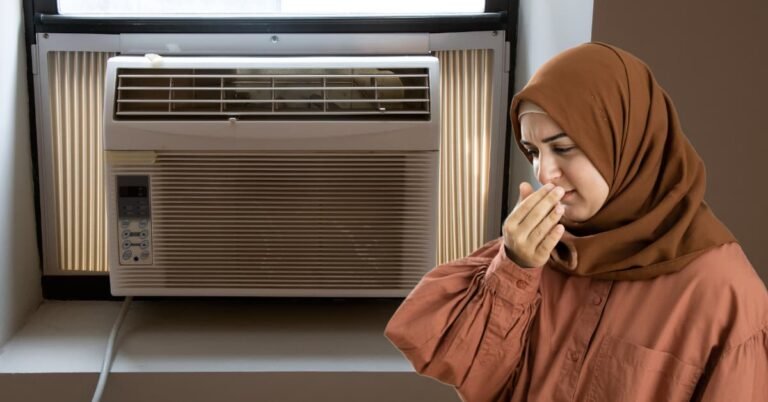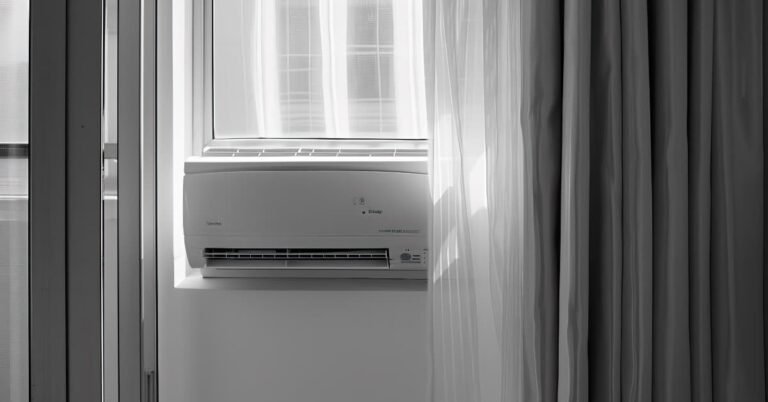Why Does My Window AC Smell Like Mildew – How To Fix
You may be uncomfortable and concerned if your window AC emits a mildew odor. Your window AC smells like mildew due to trapped moisture and mold growth. It can be fixed by cleaning thoroughly and ensuring that proper drainage is in place.
Homeowners must address this problem promptly, not only to eliminate the odor but also to maintain air quality. Maintenance, such as cleaning or replacing filters and ensuring the AC drains properly, plays a vital role in prevention.
In this article, we look at how to identify and fix the mildew smell in your AC, so you can stay comfortable and healthy.
Common Causes Of Mildew Smell In Window AC
A fresh and clean breeze is what we expect from our air conditioners. But sometimes, a nasty mildew smell can start to waft from your window AC.
This unpleasant odor can turn your cozy home into a less inviting space. Let’s explore the common causes of mildew smell in window AC units and find out how to fix them.
1. Dirty Air Filter
The air filter in your AC unit plays a crucial role in keeping air clean. A dirty filter can cause a variety of issues, including musty mildew smells. Here’s why:
- Trapped particles: Dust, pollen, and other particles get trapped in the filter over time.
- Blocked airflow: A clogged filter restricts airflow, causing the unit to work harder and less efficiently.
- Growth of microbes: The debris in a dirty filter creates a perfect environment for mold and mildew to grow.
To fix this, follow these steps:
- Turn off your AC and remove the front panel.
- Take out the filter. Check if it’s reusable or needs replacing.
- If reusable, wash it gently with warm water and mild detergent. Let it dry completely.
- Replace it if it’s beyond cleaning or damaged.
- Reinstall the filter and the front panel.
Regular filter maintenance ensures cleaner air and prevents odors.
2. Clogged Drainage System
Water that condenses in your AC unit should drain away smoothly. A clogged drainage system can cause water to pool and lead to a mildew smell.
Here’s what contributes to the clogging:
- Debris: Leaves, dirt, and insects can block the drainage paths.
- Algae growth: Standing water in the system can promote algae, which can block the drain.
To tackle a clogged drainage system, try these steps:
- Locate the drain pan and drain pipe.
- Clear any visible debris from the pan.
- Use a pipe cleaner or a thin wire to gently remove blockages in the drain pipe.
- For stubborn clogs, use a wet/dry vacuum to suck out the blockage.
- After clearing, pour a cup of white vinegar down the drain to prevent future algae growth.
Regularly checking the drainage system helps keep your AC smelling fresh.
3. Moisture Build-up
Excess moisture in your AC can lead to a mildew smell. It happens when humidity isn’t properly removed from the air. Here are some reasons why moisture might build up:
- Inadequate sealing: If the AC isn’t sealed correctly, outside air can get in and cause condensation.
- Poor ventilation: Without proper airflow, moisture can’t escape and evaporate as it should.
- High humidity: During humid seasons, the unit may struggle to remove moisture efficiently.
To prevent moisture build-up, consider these tips:
- Check the seals around your AC. Make sure it’s snug against the window to prevent outside air from entering.
- Improve room ventilation to help moisture evaporate. Use exhaust fans or open windows when possible.
- On very humid days, set your AC on a lower temperature to help it dehumidify the air better.
By controlling moisture, you can keep your window AC unit from emitting a mildew odor.

Impact Of Mildew Smell In Window AC
Understanding the impact of mildew smell in window AC is crucial. Beacuse It can pose health risks, degrade air quality, and even damage the AC unit itself.
Health Concerns
Breathing in air from a mildew-infested AC unit can lead to health issues. Mildew consists of mold spores that thrive in moist environments. When these spores circulate in your room, they can cause:
- Allergic reactions such as sneezing, coughing, and itchy eyes.
- Asthma attacks in individuals with asthma, triggered by inhaling mold spores.
- Respiratory infections as the immune system battles against mold spores.
Reduced Air Quality
A window AC with a mildew smell compromises the air you breathe. The air quality in your home is crucial for comfort and health. Poor air quality can lead to:
- Unpleasant odors that permeate furniture, curtains, and clothing.
- Increased indoor pollutants, as mildew promotes the growth of other microbes.
- Decreased oxygen levels, making the air feel stuffy and stale.
Potential Damages To AC Unit
The presence of mildew in your window AC is not just a matter of smell or health; it also affects the unit’s lifespan and efficiency. Mildew and moisture can lead to:
- Corrosion of metal parts, shortening the unit’s life.
- Blocked airways, forcing the AC to work harder and use more energy.
- Damage to electrical components, posing a risk of malfunction or even fire hazards.
Preventive Measures To Avoid Mildew Smell
Mildew smell in window AC units can turn a comfortable space into an unpleasant one. To keep your air fresh and your home healthy, adopt these preventive measures. They will help maintain your AC and keep it smelling clean.
Regular Cleaning Schedule
Keeping your window AC smelling fresh starts with regular cleaning. Dirt and moisture can lead to mold and mildew.
Here’s how to keep it clean:
- Filter Care: Replace or clean the air filter every month during high use.
- Coil Cleaning: Dust off the evaporator and condenser coils every season.
- Drain Pan: Check and clean the drain pan to prevent standing water.
- Exterior Wipe Down: Clean the unit’s exterior with a damp cloth.
Consistent upkeep keeps your AC unit free of odors and running efficiently.
Proper Ventilation
Good airflow is critical to prevent mildew smell. It stops moisture build-up. Ensure these steps for proper ventilation:
- Air Circulation: Use fans to keep air moving in the room.
- AC Usage: Run your AC regularly, even for short periods.
- Open Windows: Allow fresh air in when the weather permits.
- Check Vents: Make sure vents are open and unblocked.
Remember, air should flow freely to reduce humidity and prevent mildew growth. Use this simple guide to enhance ventilation:
Use Of Dehumidifier
To combat mildew smell, consider a dehumidifier. It reduces moisture, making it hard for mildew to grow. Here’s what to do:
- Select Size: Choose a dehumidifier that fits the size of your room.
- Placement: Place it in areas where moisture is high.
- Maintenance: Empty the water reservoir regularly.
- Hygrometer Use: Monitor humidity levels to keep them in check.
Use this table to maintain ideal humidity levels:
| Season | Ideal Humidity |
| Summer | 30-50% |
| Winter | 30-40% |
A dehumidifier can be a powerful ally in your fight against the musty odors of mildew in your window AC unit.
Conclusion
Dealing with a mildew smell from your window AC can be frustrating. Thankfully, understanding the causes and implementing the fixes outlined ensures a fresher, healthier air quality. Regular cleaning and maintenance are key. Don’t let a musty AC ruin your comfort.
Start tackling the issue today for a breath of fresh air tomorrow.






